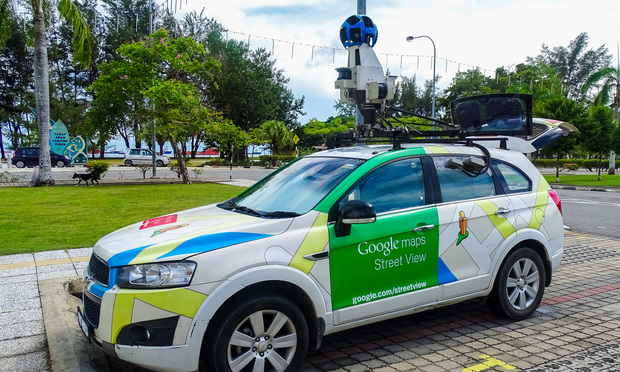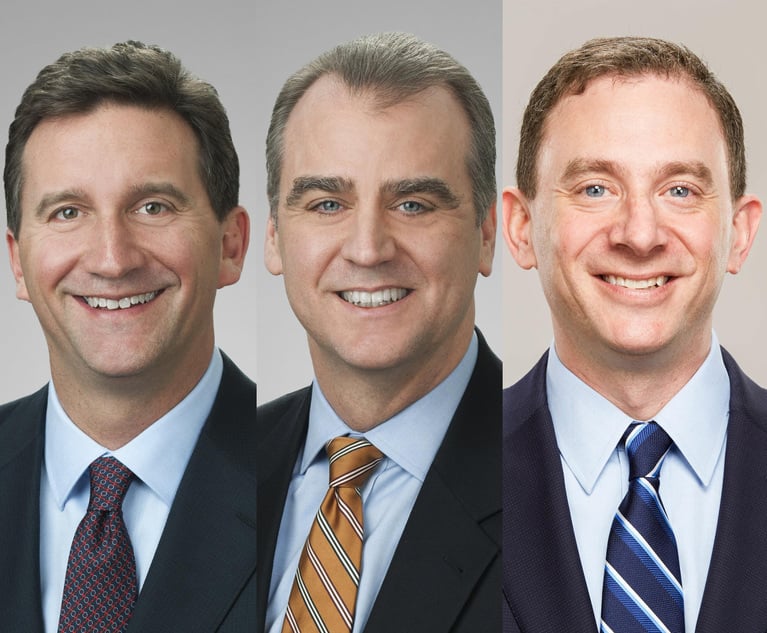US Judge Approves $13M Google Street View Privacy Settlement With No Payout to Class
The cy pres deal provides payouts to the privacy advocacy arms of universities and non-profit organizations and no direct funds to class members. Ted Frank of the Center for Class Action Fairness contends that the settlement creates an unfortunate standard.
March 19, 2020 at 07:02 PM
5 minute read
The original version of this story was published on The Recorder
 View of the Google maps or Google Street view car with 360° camera on the street in Labuan,Malaysia.Its formerly know as mapstreetview.com.
View of the Google maps or Google Street view car with 360° camera on the street in Labuan,Malaysia.Its formerly know as mapstreetview.com.
A federal judge approved a class action settlement over Google Street View vehicles tapping into homes' unencrypted Wi-Fi networks Thursday. An objector in the case contends that the opinion could usher in a widespread policy of distributing settlement funds to select organizations instead of class members.
U.S. District Judge Charles Breyer of the Northern District of California granted final approval of the cy pres deal, which provides payouts to the privacy advocacy arms of universities and non-profit organizations and no direct funds to class members.
In the opinion, Breyer said it's his job to rule if the settlement was fair, not to create cy pres doctrine policy or tailor the settlement to his own preference. He found that the cy pres award is reasonable given the "infeasibility of making direct payments to every class member."
"Class Counsel have an obligation to the class as a whole—not just to the 1% of the class that is able to file a claim," he wrote. "A settlement that would leave 99% of the class with no benefit from the Settlement Fund is a rather unsatisfying settlement. Moreover, there is something perverse in asking Class Counsel to reach a settlement that only works if there is a small claims rate."
Attorneys in the settlement will receive 24% of the net $13 million settlement. The remaining settlement fund will be distributed equally between the Center on Privacy & Technology at Georgetown Law; Center for Digital Democracy; MIT Internet Policy Research Initiative; World Privacy Forum; Public Knowledge; American Civil Liberties Union Foundation; Consumer Reports; EPIC13; and Rose Foundation for Communities and the Environment. Under the terms of the settlement, Google will destroy any remaining data related to the suit within 45 days and agreed to no longer collect and store such data without consent.
Plaintiffs' lawyers estimate that the settlement encompasses 60 million class members who claim that Google's Street vehicles "surreptitiously collected, decoded, and stored data from [their] WiFi connection, including payload data" between 2007 and 2010, when the consolidated class action complaint was filed.
Plaintiffs counsel from Spector Roseman, Lieff Cabraser and Cohen Milstein said, "We are pleased with the court's thorough, well-reasoned opinion approving the settlement."
Wilson Sonsini Goodrich & Rosati's David Kramer and Brian Willen referred comment to their client Google, which did not respond to a request for comment.
Breyer said that the decade-long litigation was "risky," because it wasn't clear that Google violated the Electronic Communications Privacy Act, if plaintiffs' data was publicly accessible or if plaintiffs could reap statutory damages.
Plus, by now, class members are increasingly likely to trash their old WiFi routers, which are crucial to proving Google's snooping, he said.
The Arizona Attorney's General Office, which submitted an amicus brief in the case on behalf of a nine attorneys general who argued that cy pres settlements offer "nothing" to absent class members, said in an email statement, "Our focus will always be on protecting harmed consumers and obtaining restitution, not about lining the pockets of plaintiffs' attorneys and filling the bank accounts of unrelated organizations. We will continue to fight for consumers in unfair class action settlements."
Breyer also noted that the U.S. Supreme Court hinted that it ought to provide guidance on cy pres settlements in Frank v. Gaos. In the court's denial of a petition of certiorari filed by the Center for Class Action Fairness' Ted Frank, who also objected in the Google case, Chief Justice John Robert wrote that if SCOTUS had picked up that case, it "might not have afforded the Court an opportunity to address more fundamental concerns surrounding the use of such remedies in class action litigation, including when, if ever, such relief should be considered."
Breyer, in Thursday's order, said he "is aware of no controlling authority holding that settlements providing direct payments to class members are always preferable to cy pres-only settlements. Indeed, controlling authority holds to the contrary."
Frank, who represents class member and objector David Lowrey, said Breyer's opinion sets up a very clean legal issue on what it means to be non-distributable and whether every class action can be characterized as non-distributable.
"We're looking forward to seeing what other courts have to say about this," he said, noting that he plans to appeal the case to the U.S. Court of Appeals for the Ninth Circuit.
With Gaos routed back to the district court, Frank said the Google Street View litigation has the potential to be the case the Supreme Court uses to give guidance on cy pres settlements.
But on that point, he said it's unfortunate the judge to issue this decision is Breyer since his brother, Justice Stephen Breyer, will recuse.
"They're less likely to grant certs when there's a recusal if they think there would be a different vehicle," he said. "At the moment this is the case that's closest to the Supreme Court."
Breyer said the award would help fund the cy pres recipients effective privacy advocacy work "and likely yield actual improvements to internet privacy."
But Frank thinks the settlement sets an unfortunate precedent.
"I think you're going to see a lot more cy pres settlements if this is the standard," he said. "I don't think the Supreme Court will stand for that. It's an unfortunate wealth transfer from everyday consumers to universities with multibillion-dollar endowments."
This content has been archived. It is available through our partners, LexisNexis® and Bloomberg Law.
To view this content, please continue to their sites.
Not a Lexis Subscriber?
Subscribe Now
Not a Bloomberg Law Subscriber?
Subscribe Now
NOT FOR REPRINT
© 2025 ALM Global, LLC, All Rights Reserved. Request academic re-use from www.copyright.com. All other uses, submit a request to [email protected]. For more information visit Asset & Logo Licensing.
You Might Like
View All
Litigators of the Week: A Knockout Blow to Latest FCC Net Neutrality Rules After ‘Loper Bright’

Litigators of the (Past) Week: Defending Against a $290M Claim and Scoring a $116M Win in Drug Patent Fight
Law Firms Mentioned
Trending Stories
- 1'It's Not Going to Be Pretty': PayPal, Capital One Face Novel Class Actions Over 'Poaching' Commissions Owed Influencers
- 211th Circuit Rejects Trump's Emergency Request as DOJ Prepares to Release Special Counsel's Final Report
- 3Supreme Court Takes Up Challenge to ACA Task Force
- 4'Tragedy of Unspeakable Proportions:' Could Edison, DWP, Face Lawsuits Over LA Wildfires?
- 5Meta Pulls Plug on DEI Programs
Who Got The Work
Michael G. Bongiorno, Andrew Scott Dulberg and Elizabeth E. Driscoll from Wilmer Cutler Pickering Hale and Dorr have stepped in to represent Symbotic Inc., an A.I.-enabled technology platform that focuses on increasing supply chain efficiency, and other defendants in a pending shareholder derivative lawsuit. The case, filed Oct. 2 in Massachusetts District Court by the Brown Law Firm on behalf of Stephen Austen, accuses certain officers and directors of misleading investors in regard to Symbotic's potential for margin growth by failing to disclose that the company was not equipped to timely deploy its systems or manage expenses through project delays. The case, assigned to U.S. District Judge Nathaniel M. Gorton, is 1:24-cv-12522, Austen v. Cohen et al.
Who Got The Work
Edmund Polubinski and Marie Killmond of Davis Polk & Wardwell have entered appearances for data platform software development company MongoDB and other defendants in a pending shareholder derivative lawsuit. The action, filed Oct. 7 in New York Southern District Court by the Brown Law Firm, accuses the company's directors and/or officers of falsely expressing confidence in the company’s restructuring of its sales incentive plan and downplaying the severity of decreases in its upfront commitments. The case is 1:24-cv-07594, Roy v. Ittycheria et al.
Who Got The Work
Amy O. Bruchs and Kurt F. Ellison of Michael Best & Friedrich have entered appearances for Epic Systems Corp. in a pending employment discrimination lawsuit. The suit was filed Sept. 7 in Wisconsin Western District Court by Levine Eisberner LLC and Siri & Glimstad on behalf of a project manager who claims that he was wrongfully terminated after applying for a religious exemption to the defendant's COVID-19 vaccine mandate. The case, assigned to U.S. Magistrate Judge Anita Marie Boor, is 3:24-cv-00630, Secker, Nathan v. Epic Systems Corporation.
Who Got The Work
David X. Sullivan, Thomas J. Finn and Gregory A. Hall from McCarter & English have entered appearances for Sunrun Installation Services in a pending civil rights lawsuit. The complaint was filed Sept. 4 in Connecticut District Court by attorney Robert M. Berke on behalf of former employee George Edward Steins, who was arrested and charged with employing an unregistered home improvement salesperson. The complaint alleges that had Sunrun informed the Connecticut Department of Consumer Protection that the plaintiff's employment had ended in 2017 and that he no longer held Sunrun's home improvement contractor license, he would not have been hit with charges, which were dismissed in May 2024. The case, assigned to U.S. District Judge Jeffrey A. Meyer, is 3:24-cv-01423, Steins v. Sunrun, Inc. et al.
Who Got The Work
Greenberg Traurig shareholder Joshua L. Raskin has entered an appearance for boohoo.com UK Ltd. in a pending patent infringement lawsuit. The suit, filed Sept. 3 in Texas Eastern District Court by Rozier Hardt McDonough on behalf of Alto Dynamics, asserts five patents related to an online shopping platform. The case, assigned to U.S. District Judge Rodney Gilstrap, is 2:24-cv-00719, Alto Dynamics, LLC v. boohoo.com UK Limited.
Featured Firms
Law Offices of Gary Martin Hays & Associates, P.C.
(470) 294-1674
Law Offices of Mark E. Salomone
(857) 444-6468
Smith & Hassler
(713) 739-1250








